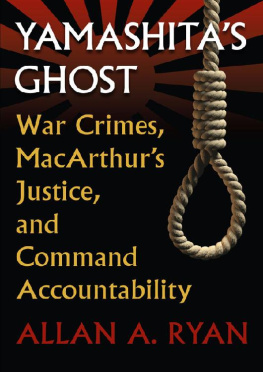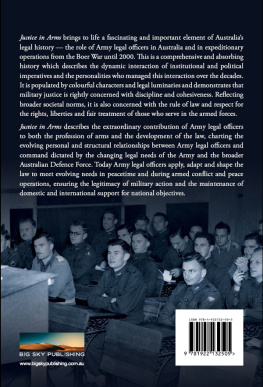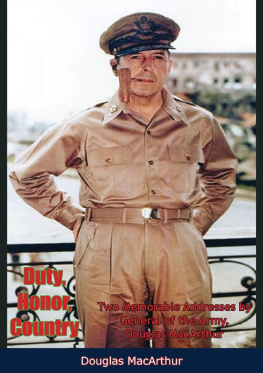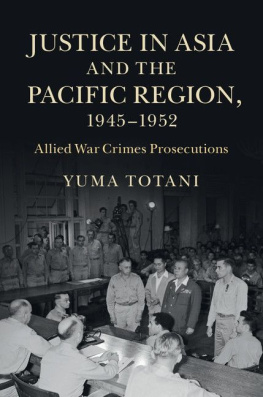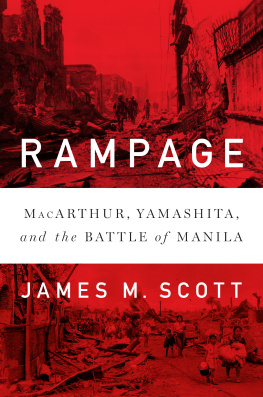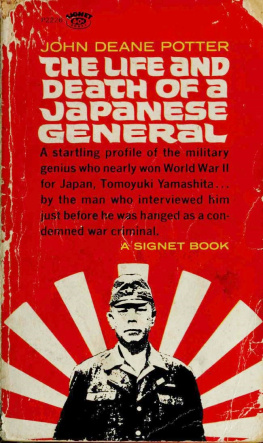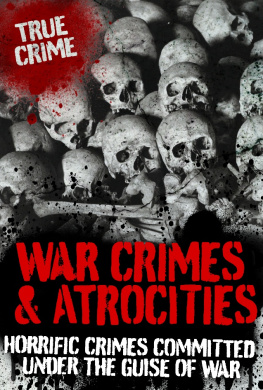Yamashitas Ghost
MODERN WAR STUDIES
Theodore A. Wilson
General Editor
Raymond Callahan
J. Garry Clifford
Jacob W. Kipp
Allan R. Millett
Carol Reardon
Dennis Showalter
David R. Stone
Series Editors
Yamashitas Ghost
War Crimes, MacArthurs
Justice, and Command
Accountability
Allan A. Ryan

University Press of Kansas
2012 by the University Press of Kansas
All rights reserved
Published by the University Press of Kansas (Lawrence, Kansas 66045), which
was organized by the Kansas Board of Regents and is operated and funded by
Emporia State University, Fort Hays State University, Kansas State University,
Pittsburg State University, the University of Kansas, and Wichita State
University
Library of Congress Cataloging-in-Publication Data
Ryan, Allan A.
Yamashitas ghost : war crimes, MacArthurs justice, and command accountability / Allan A. Ryan.
p. cm. (Modern war studies)
Includes bibliographical references and index.
ISBN 9780-70061881-1 (cloth : alk. paper)
ISBN 9780-70062014-2 (paper : alk. paper)
ISBN 9780-70062055-5 (ebook)
1. Yamashita, Tomobumi, 18851946Trials, litigation, etc. 2. War crime
trialsPhilippinesManila. 3. Command responsibility (International law)
4. World War, 19391945Atrocities. 5. MacArthur, Douglas, 18801964 . I. Title.
KZ1184. Y36R93 2012
341. 690268dc23
2012024202
British Library Cataloguing-in-Publication Data is available.
Printed in the United States of America
10 9 8 7 6 5 4 3 2 1
The paper used in this publication is recycled and contains 30 percent postconsumer waste. It is acid free and meets the minimum requirements of the American National Standard for Permanence of Paper for Printed Library Materials Z39. 481992.
To my father, Allan A. Ryan (19222004),
United States Army, 19421946,
and his brother, John P. Ryan (1921),
United States Army, 19421946,
and my father-in-law, Raymond E. Foote (19202009),
United States Army Air Forces, 19421945
Contents
To rule well a king requires two things: arms and laws, that by them both times of war and of peace may rightly be ordered. For each stands in need of the other, that the achievement of arms be conserved by the laws, [and] the laws themselves preserved by the support of arms. If arms fail against hostile and unsubdued enemies, then will the realm be without defence; if laws fail, justice will be extirpated, nor will there be any man to render just judgment.
Henry de Bracton, On the Laws and Customs of England,
translated from the Latin by Samuel E. Thorne
(Harvard University Press, 1968)
***
It is during our most challenging and uncertain moments that our Nations commitment to due process is most severely tested; and it is in those times that we must preserve our commitment at home to the principles for which we fight abroad.
Justice Sandra Day OConnor,
Supreme Court of the United States,
Hamdi v. Rumsfeld, 542 U. S. 507 (2004)
Cast
General Tomoyuki Yamashita, Commanding General, Fourteenth Area Army, Philippines 19441945
General of the Army Douglas MacArthur, Commanding General, Southwest Pacific
Members of the military commission:
Major General Russel B. Reynolds, presiding
Major General Leo Donovan
Major General James A. Lester
Brigadier General Egbert F. Bullene
Brigadier General Morris Handwerk
Members of the prosecution:
Major Robert Kerr, chief prosecutor
Captain William N. Calyer
Captain Delmas C. Hill
Captain Jack M. Pace
Captain M. D. Webster
Lieutenant George E. Mountz
Members of the defense:
Colonel Harry E. Clarke, chief defense counsel
Lieutenant Colonel James G. Feldhaus
Lieutenant Colonel Walter C. Hendrix
Major George F. Guy
Captain A. Frank Reel
Captain Milton Sandberg
Justices of the Supreme Court
Chief Justice Harlan Fiske Stone
Associate Justice William O. Douglas
Associate Justice Hugo L. Black
Associate Justice Wiley Rutledge
Associate Justice Frank Murphy
Associate Justice Stanley Reed
Associate Justice Felix Frankfurter
Associate Justice Harold Burton
Associate Justice Robert H. Jackson on leave, 19451946
Preface
The first war crimes trial after World War II took place in Manila. The accused man was General Tomoyuki Yamashita, commander of the Japanese army in the Philippines in the final year of the war, a year that saw horrendous atrocities committed by Japanese troops in Manila and elsewhere in the islands. Yamashita was arraigned in Manila on October 8, 1945, five weeks after Japans surrender in Tokyo. General Douglas MacArthur accused Yamashita of the crimeif it was oneof failure to control his troops. Five American generals, none of them with any legal training, were appointed as a military commission to hear the evidence and render a verdict on 123 separate counts describing ghastly murders, tortures, rapes, arson, and other crimes. After five weeks of testimony, much of it in the anguished words of the victims themselves, the commission convicted Yamashita and ordered him executed. On February 23, 1946, on a scaffold in the predawn darkness near Manila, a hangman placed a noose around Yamashitas neck and he dropped to his death.
But Yamashita was no ordinary criminal, and this was no ordinary trial. He was Japans most accomplished military leader, whose brilliant campaign against British and Australian troops in Malaya and Singapore in 1942 had delivered what Winston Churchill called the most devastating defeat in the history of the British Empire. No friend of the warlords in Tokyo, he had been exiled to a backwater command in Manchuria for two years, to be recalled only in 1944 and sent to the Philippines, where he fought MacArthurs vastly superior American forces to a standstill, finally surrendering in the hills of the island of Luzon only when the war was finally, irretrievably, and officially lost.
He was a dignified and thoughtful man who earned the respect and even admiration of the American military lawyers who defended him vigorously at the trial. Had Yamashita ordered these appalling crimes, his conviction and execution could not have come too soon. But he did not. He maintained stoutly and consistently from the witness chair in Manila that he had not ordered these crimes, and that he had in fact ordered his subordinate commanders to abandon Manila as the American army approached and to retreat to the hills where he himself had already fled, hoping desperately only to hold off MacArthurs forces long enough to allow Japan to prepare its homeland defenses against inevitable invasion. The evidence fully supported his account.
After his conviction, his lawyers took the extraordinary step of asking the Supreme Court of the United States to hear his appeal, and that Court, taking an extraordinary step itself, agreed to do so. It upheld the conviction in what remains today its only decision on the responsibility of a military commander for the actions of his troops. It did so over the impassioned dissents of two of its members, who wrote eloquent opinions, invoking for the first time in that Courts history the concept of international human rights.
The precedent established in In re Yamashita has proven to be both troublesome and embarrassing for the United States. Had it been followed faithfully in the 1960s and 1970s, it might well have justified the trial and conviction of American generals of the Vietnam War. Were it to be followed faithfully today, it might well justify the conviction of American generals and political leaders for the tortures at Abu Ghraib prison in Iraq. Conversely, however, it would also justify a decision by the Supreme Court that the so-called unlawful enemy combatants at Guantnamo were entirely the business of the military and its commander in chief, entitled to none of the due process of law guaranteed by the Constitution of the United States. In fact, the Supreme Court has ruled that just the opposite is so.
Next page
